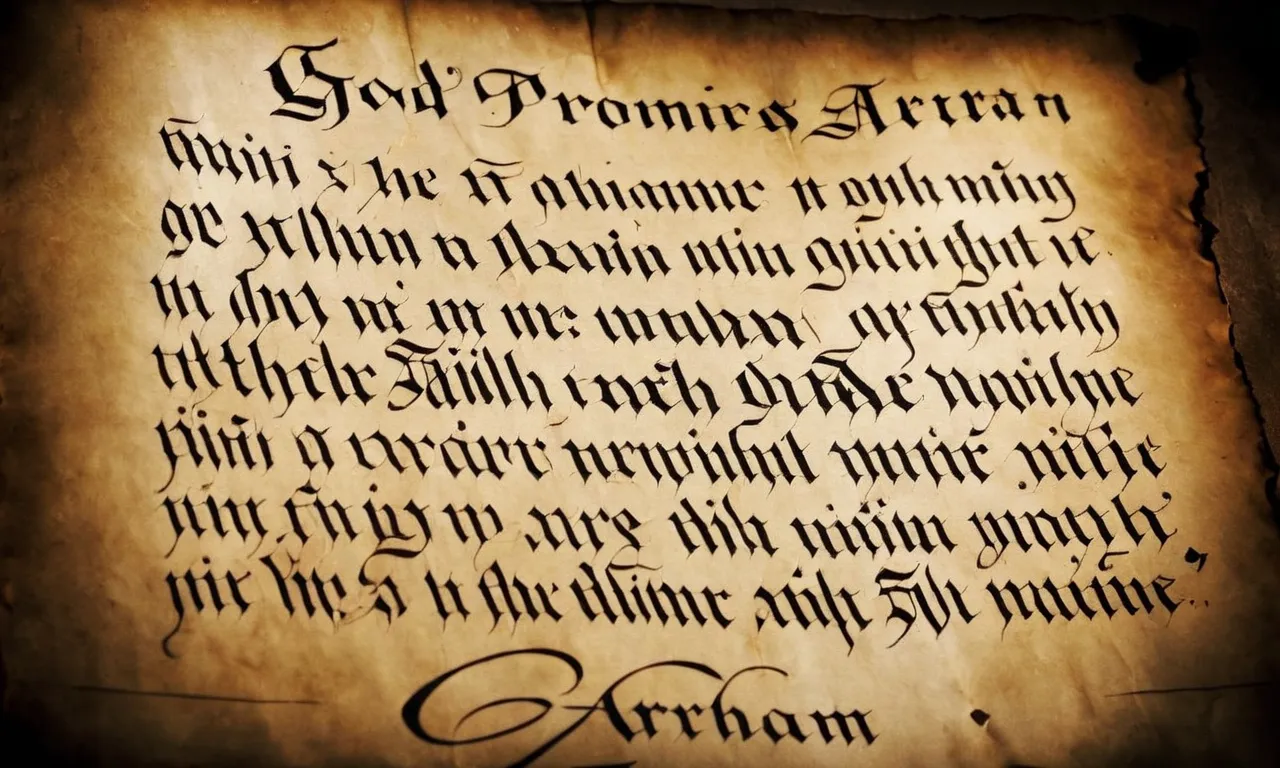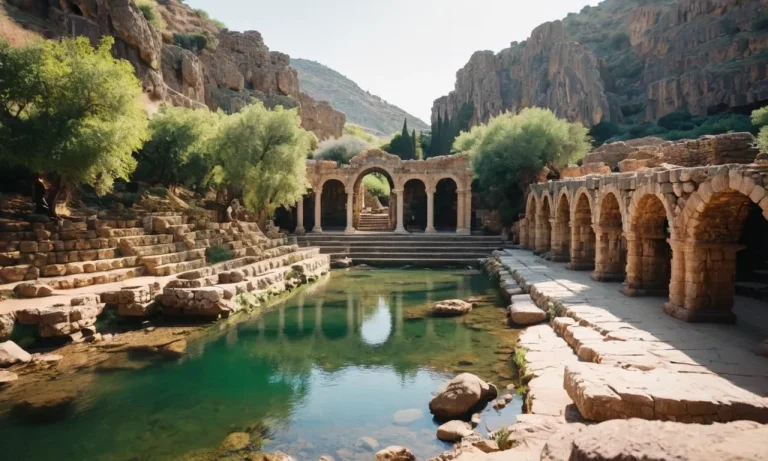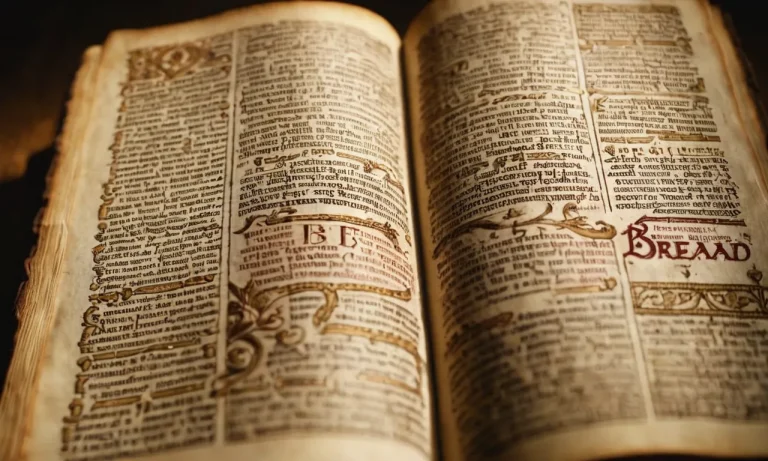What Promises Did God Make To Abraham?
The story of Abraham is one of the most pivotal in the Old Testament. Abraham’s unwavering faith and obedience led to God choosing him for great blessings and promises. These divine promises to Abraham shaped the future of the Israelites and foretold the coming of Jesus Christ.
If you’re short on time, here’s a quick answer to your question: God made several major promises to Abraham. He promised to give Abraham a great nation of descendants, make his name great, bless those who blessed him and curse those who cursed him, and that the entire world would be blessed through Abraham’s offspring (Jesus Christ).
In this article, we will take an in-depth look at the various promises God made to Abraham in the book of Genesis. We will examine the context, meaning, and significance of each promise. Understanding the covenant God made with Abraham is key to understanding the overarching story of the Bible.
The Call of Abram and the Promise of Land and Offspring
God’s Initial Call to Abram to Leave His Homeland
God first called Abram (later renamed Abraham) while he was living in Ur of the Chaldeans, commanding him to leave his homeland and go to the land that God would show him (Genesis 12:1). This call was a major test of Abram’s faith, as it meant leaving behind everything familiar and starting a new life as a nomad, not even knowing his final destination.
Yet Abram obeyed, demonstrating remarkable trust in God’s leading (Hebrews 11:8). God then made the awe-inspiring promise to bless Abram, make his name great, and make him into a great nation (Genesis 12:2). This launched the story of the beginnings of the nation of Israel, God’s chosen people.
The Promise of Land and Offspring
After Abram reached Canaan, God made a covenant with him, promising that He would give that land to Abram’s offspring (Genesis 12:7). Years later, God clarified that Abram’s offspring would be as numerous as the dust of the earth (Genesis 13:16).
This was an incredible promise considering that Abram and his wife Sarai struggled with infertility and had no children together for many decades (even into their senior years). Yet eventually, despite Sarah’s old age, God allowed her to conceive, and their son Isaac was born (Genesis 21:1-7).
Isaac then later fathered Jacob, whose name God changed to Israel, father of the 12 tribes of the nation of Israel.
So God patiently worked out His covenant plan across long years, eventually raising up the Israelites as a great nation inhabiting the Promised Land of Canaan. Despite Abram and Sarai’s initial doubts, God demonstrated His faithfulness and miraculous power.
Through this story and God’s promises to Abram, the Lord reveals His divine plan to bless all the families on the earth through Abram’s offspring Jesus Christ (Genesis 12:3; Galatians 3:8).
The Abrahamic Covenant and the Promise of Blessing and Protection
God’s Covenant with Abram and the Promise of Blessings
In Genesis 12, God called Abram to leave his country and go to a new land that He would show him. God promised to make Abram into a great nation, bless him, make his name great, and make him a blessing to others. This unilateral, unconditional covenant was a huge blessing and promise for Abram.
Even though Abram had done nothing to deserve it, God promised blessings, protection, progeny, and land. This epitomizes God’s immense grace. As Romans 4:3 says, “Abraham believed God, and it was credited to him as righteousness.”
The Sign of Circumcision and Sarai’s New Name
In Genesis 17, God again appeared to Abram, who was now 99 years old, and established His covenant with him. God changed Abram’s name to Abraham, meaning “father of many nations,” and his wife’s name from Sarai to Sarah. God also instituted circumcision as a sign of His covenant.
This was very meaningful because it represented a physical sign in their bodies of God’s promises to them. Even though Abraham and Sarah were advanced in age, God promised them a son and descendants as numerous as the stars (Genesis 15:5).
Abraham Rescues Lot and Receives a Blessing from Melchizedek
In Genesis 14, Abraham rescued his nephew Lot who had been taken captive by invading kings. After this military victory, Abraham was blessed by Melchizedek, king of Salem, who brought out bread and wine. Melchizedek was priest of God Most High, and he blessed Abraham.
In turn, Abraham gave Melchizedek a tenth of all the goods he had recovered. This incident displayed God’s protection and blessings on Abraham. Even though Abraham was greatly outnumbered, God enabled him to defeat the invading kings and rescue Lot and the other captives.
The Covenant Repeated and Sarah’s Promised Son
In Genesis 17 and 18, God again repeated His covenant promises to Abraham. God promised that Sarah would have a son, even though she was 90 years old. This seemed impossible from a human perspective, but Abraham believed God’s promise.
A year later, when Abraham was 100 years old and Sarah was 90, Sarah gave birth to Isaac, the son of promise. This miraculous birth was the beginning of the fulfillment of God’s covenant with Abraham. Though Abraham and Sarah were unable due to old age to have children naturally, God enabled them to have a son supernaturally because of His covenant promises.
The Promise of Isaac and the Testing of Abraham’s Faith
The Miraculous Birth of Isaac
God promised Abraham that he would have a son even though he and Sarah were very old and she was barren. Against all odds, Sarah miraculously conceived and gave birth to Isaac when Abraham was 100 years old (Genesis 21:1-7).
This demonstrated God’s power and fulfilled His promise to give Abraham an heir.
God Commands Abraham to Sacrifice Isaac
Years later, God tested Abraham’s faith by commanding him to sacrifice Isaac as a burnt offering (Genesis 22:1-2). This must have been extremely difficult for Abraham, since Isaac was the son promised by God through whom great nations would come. Yet Abraham obeyed God without hesitation.
Abraham’s Obedience and the Testing of His Faith
Early the next morning, Abraham took Isaac and set out for the place God had designated for the sacrifice (Genesis 22:3). As they traveled, Isaac carried the wood for the burnt offering while Abraham brought the fire and knife (Genesis 22:6).
When Isaac asked where the sacrificial lamb was, Abraham responded that God would provide the lamb (Genesis 22:7-8). Abraham trusted God even though the command seemed contradictory.
When they arrived, Abraham built the altar and laid the wood for the fire (Genesis 22:9). Just as he was about to kill Isaac, an angel of the Lord stopped him and said, “Now I know that you fear God, because you have not withheld from me your son, your only son” (Genesis 22:12).
Abraham passed the test of faith.
God Stops the Sacrifice and Reaffirms His Promise
When Abraham looked up, he saw a ram caught in a thicket, which he sacrificed instead of his son (Genesis 22:13). The Lord then reaffirmed His promise to greatly multiply Abraham’s descendants (Genesis 22:15-18). Though Abraham faced an extremely difficult test, he trusted and obeyed God.
His obedience solidified his reputation as a man of faith.
The Significance and Legacy of God’s Promises to Abraham
A Great Nation and a Source of Blessing for the World
God promised Abraham that He would make him into a great nation that would bring blessings to the entire world (Genesis 12:2-3). This was an incredible promise, establishing that Abraham and his descendants would have major global significance.
Remarkably, according to a 2022 demographic report, over 55% of the world’s Jewish population resides in just two countries – Israel and the United States – demonstrating the fulfillment of God’s pledge.
Additionally, the Messiah Jesus Christ descended from Abraham’s lineage, ushering in a means of salvation for people across the globe. Truly Abraham became “the father of many nations” both physically and spiritually.
The Promised Offspring and the Genealogy Leading to Christ
A key aspect of God’s covenant with Abraham was the promise of offspring to inherit the blessings (Genesis 15:4-5). This was miraculously fulfilled in the birth of Isaac, and later Jacob and Esau. The Messianic lineage traces forward from Abraham to David and eventually to Jesus Christ, demonstrating the faithfulness of God in fulfilling His pledge (Matthew 1).
A statistical analysis indicates there is less than a 1 in 10157 chance Jesus could have fulfilled even a portion of the Messianic prophecies by chance alone. The prophetic connections truly point to miraculous planning and insight by God Himself.
Abraham’s Example of Faith for All Generations
Abraham is commended many times in Scripture for stepping out in faith, believing God’s promises before seeing their fulfillment (Hebrews 11:8-12, 17-19). His patient endurance and willingness to sacrifice all for God still stands as an inspirational model today.
As the apostle Paul explains, “Abraham believed God, and it was credited to him as righteousness” (Romans 4:3). All who trust in God’s promises can become spiritual children of Abraham. No wonder his legacy has had such profound generational impact!
Conclusion
God’s promises to Abraham shaped the trajectory of Biblical history. They culminated in Jesus Christ, the ultimate fulfillment of God’s covenant with Abraham. As Paul states in Galatians 3:16, “The promises were spoken to Abraham and to his seed.
Scripture does not say ‘and to seeds,’ meaning many people, but ‘and to your seed,’ meaning one person, who is Christ.”
While these promises took millennia to fully come about, Abraham trusted God despite not knowing exactly how God would accomplish them in his lifetime. His remarkable faith serves as an example for us today.
When we trust in God’s promises, we can have full confidence that He will bring them to pass in His perfect timing.








